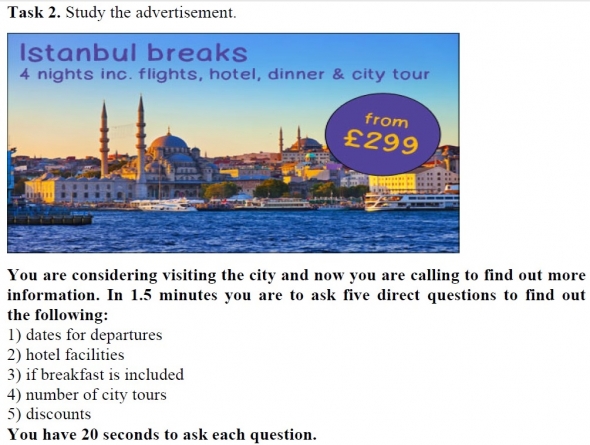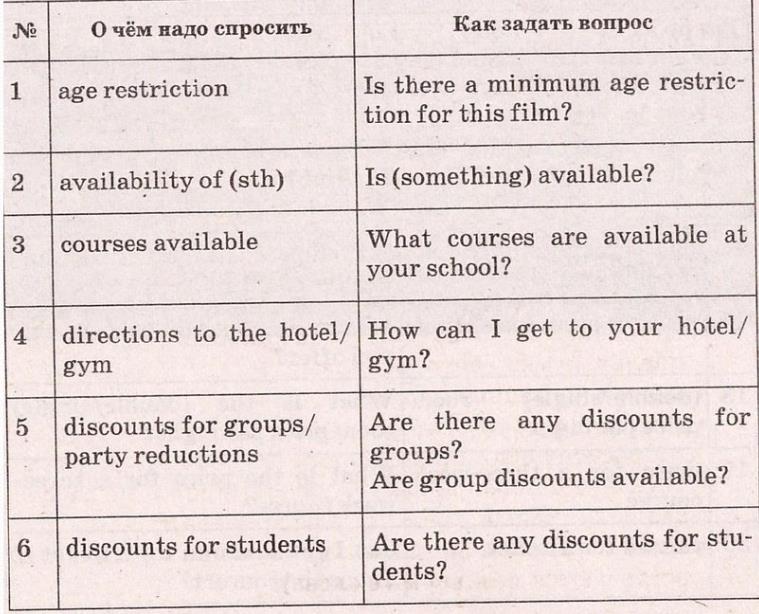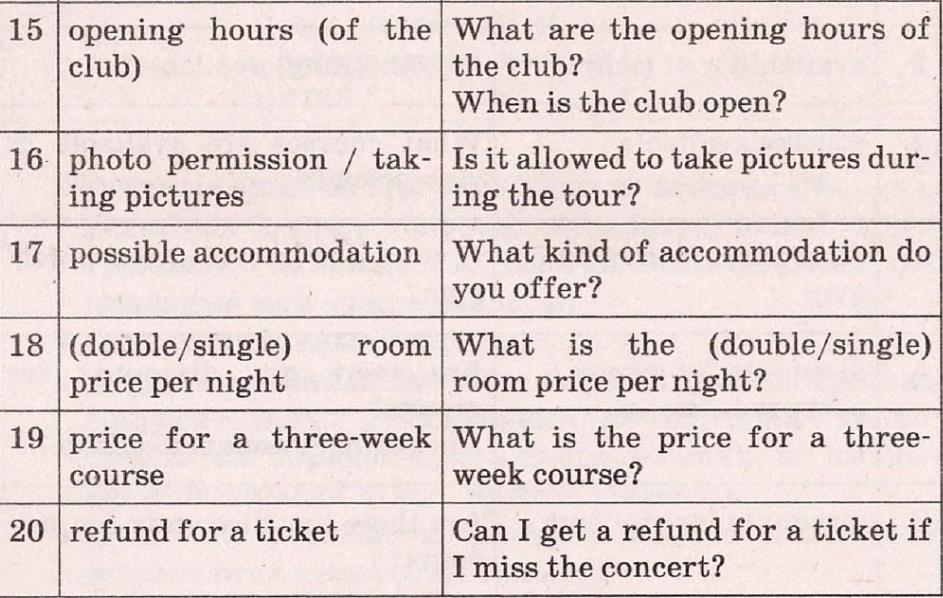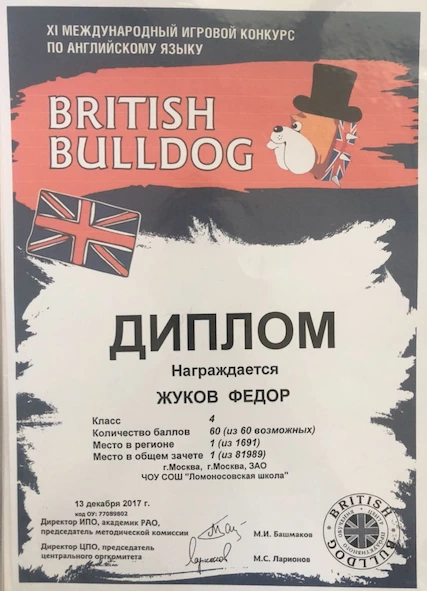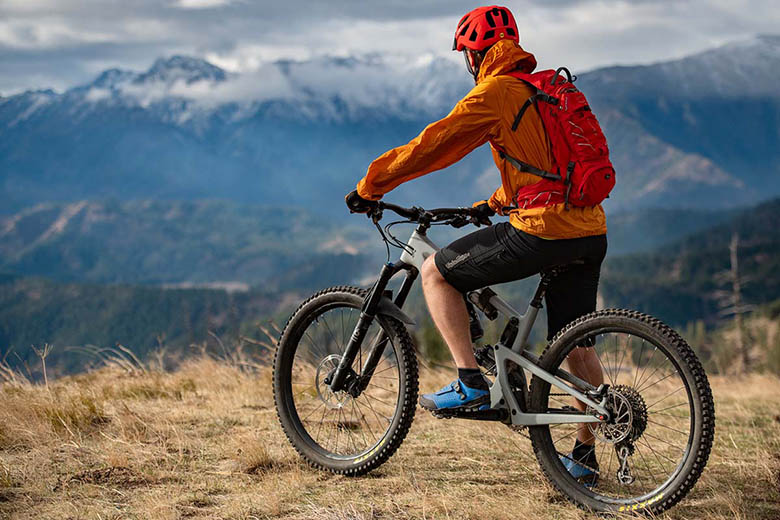Примечание: Подробнее о разделе “Устная часть” ЕГЭ по английскому языку можно прочитать здесь.
В ЕГЭ по английскому языку в задании 2 предлагается ознакомиться с рекламным объявлением и задать пять прямых вопросов на основе ключевых слов и предложенного рекламного объявления.
Формат задания – условный диалог-расспрос.
Время на подготовку – 1.5 минуты.
Время на выполнение задания – 1 минута
Максимальный балл – 5 баллов.
На экране компьютера поочередно будут появляться каждый из пяти пунктов задания. У Вас будет всего 20 секунд, для того чтобы построить один вопрос.
Критерии оценивания задания 2 на ЕГЭ
Максимальное количество баллов, которое можно получить в задании 2 – 5 баллов. Таким образом, если в задание просят озвучить 5 вопросов, то и оценивается каждый вопрос в 1 балл.
| 1 балл | 0 баллов |
| — вопрос по содержанию отвечает поставленной задаче; — вопрос имеет правильную грамматическую форму прямого вопроса; — возможные фонетические и лексические погрешности не затрудняют восприятия. |
— вопрос не задан, или заданный вопрос по содержанию не отвечает поставленной задаче; — И/ИЛИ вопрос не имеет правильной грамматической формы прямого вопроса; — И/ИЛИ фонетические и лексические ошибки препятствуют коммуникации. |
Обратите внимание!
Время, которое отводится за каждый вопрос достаточно для того, чтобы успеть исправить ошибку. То есть если экзаменуемый задал вопрос и понял, что допустил ошибку, то он может успеть в отведенное время задать тот же вопрос правильно. Не забывайте, оценивается один вопрос – последний из прозвучавших.
Типичные ошибки на экзамене по английскому языку в задании 2 (ЕГЭ)
Рекомендуется:
- использовать преимущественно общие и специальные вопросы;
- употреблять простое настоящее и простое будущее время активного и пассивного залога;
- в данном задание самое главное – верно задать вопрос, не надо что-то выдумывать и вспоминать сложную лексику.
- соблюдать интонацию: общий вопрос произносится с восходящей интонацией, а специальный – с нисходящей.
Не рекомендуется:
- задавать косвенные вопросы;
- задавать несколько вопросов к одному и тому же пункту:
- не забывать схему каждого типа вопроса (не путать вспомогательные вопросы, порядок слов и т.д. и т.п.)
Типы вопросов в английском языке
Умение задавать вопросы является важным при изучении английского языка. Соотвественно, чтобы выполнить данное задание на высший балл экзаменуемому, необходимо знать все типы вопросов английского языка.
Примечание: О типах вопросов в английском языке можно прочитать здесь.
Примечание: Ознакомиться с подсказками как научить ребенка составлять вопросы на английском языке.
Обратите внимание!
Не рекомендуется задавать вопрос начиная со слов “Could you tell me…”, так как ошибочно можно задать не вопрос, а сказать просьбу. Например,
Could you tell me price? – это просьба (ошибка!)
Could you tell me how many
Напоминание!
Не забывай про интонацию в вопросительных предложениях. Интонация должна повышаться в общем вопросе и понижаться в специальном.
Клише для успешной сдачи задания 2 в устной части ЕГЭ по английскому языку
Предлагаем несколько таблиц наиболее часто встречающихся вопросов (клише и шаблоны вопросов на разные темы). Для себя вы можете выбрать тот вариант, который наиболее удобный для обучения.
Вариант 1. Клише для задания 2 в части “Говорение” по английскому языку









Do you have any recommendations?
32. Services that they provide during the trip – обслуживание, которое они предоставляют во время поездки.
What services do you provide during the trip?
33. Tours that they have – Туры, которые имеются.
How many tours do you have?
34. Free Wi-Fi / website.
Is there access to free Wi-Fi?
Is there a website of your shop?
35. Functions of the device / advantages of the device
What functions does that device have?
What advantages does that device have?
36.
Вариант 2. Таблицы для задания 2 в части “Говорение” по английскому языку
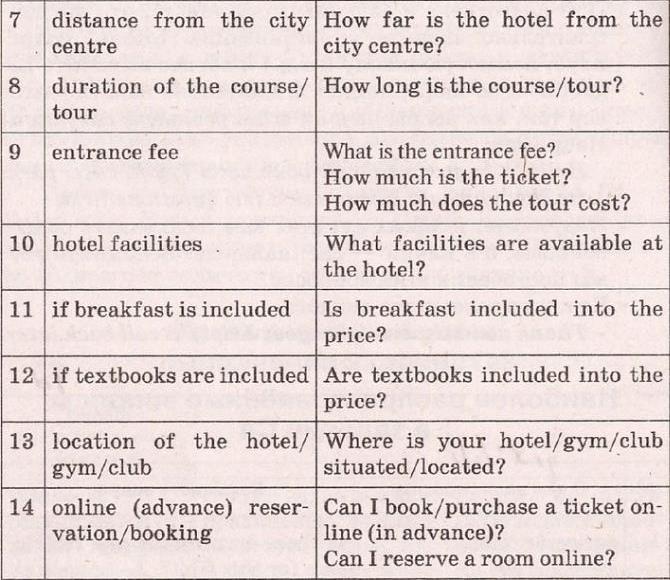
I have taught TOEFL in MOSCOW for more than 11 years. I have learned many tips and techniques about how to earn a high TOEFL score. One of the most difficult parts in every TOELF test is its speaking part. It consists of 6 questions. It is not enough just to speak English well to get the maximum points possible on the test.
Обучаю разговорному английскому. Помогу Вам подготовиться к TOEFL или ЕГЭ.
За полгода вывожу ученика начального уровня на уровень уверенного общения, свободного выражения своих мыслей. Специализируюсь на экспресс-методах обучения.
Вслед за разбором 1 задания устной части ЕГЭ переходим к диалогу-расспросу с устной опорой, который по странному стечению обстоятельств легче второго задания устной части ОГЭ.
Легенда гласит, что вы увидели какое-то рекламное объявление и хотите уточнить информацию по предложенным в рекламе пунктам:
Реклама может быть всякая – курсы иностранного языка, туристические достопримечательности, места отдыха, города, круизы, спортивные центры – все в рамках тематики кодификатора с сайта ФИПИ.. Обратите внимание не данные опоры под пунктами 1- 5. Они сориентируют, про что нужно узнавать информацию и какие вопросы задавать. Все эти рекламные объявления и опоры перекликаются до такой степени, что после 10-й карточки это задание уже будет казаться старым добрым другом.
На обдумывание вопросов дается 1.5 минуты, после этого на экран выводится по 1 пункту и на ответ на каждый вопрос дается 20 секунд. То есть, в сумме на все задание уйдет примерно 3 минуты. За каждый правильно заданный вопрос дается 1 балл, то есть максимум за задание – 4 баллов.
Давайте посмотрим, что такое “правильно заданный вопрос” и как за него получить заветный балл.
Критерии оценивания
- Вопрос по содержанию отвечает поставленной задаче” – здесь предельно ясно – если в вопросе написано “location of the swimming pool” – вопросы про “скока стоит?” или “скидку сделаете?” будут неуместны.
- “Имеет правильную грамматическую форму прямого вопроса”. В прямом вопросе вспомогательный глагол стоит перед подлежащим. Например, Where is the swimming pool located? – прямой, Could you tell me where the swimming pool is located? – косвенный вопрос.
- “Возможные фонетические и лексические погрешности не затрудняют восприятия”. Ученик не произносит “thing” как “think” и не делает ошибок в выборе слов – не спрашивает Where is the swimming pool placed? вместо Where is the swimming pool located? Также соблюдены правильные интонационные контуры вопроса – восходящий тон в общем и нисходящий в специальном вопросе.
Внимание! Заданный вопрос оценивается в 0 баллов, если:
- вопрос не задан или заданный вопрос по содержанию не отвечает поставленной задаче и/или не имеет правильной грамматической формы прямого вопроса
- задан сокращенный вопрос типа “Could you tell me about the price?” и “What about…”. Вопрос, начинающийся с вежливого оборота “Could you tell me…?”, принимается, только если за ним следует полный косвенный вопрос с соответствующим порядком слов, т.е. “Could you tell me where the hotel is situated?”. Владение грамматической нормой экзаменуемый демонстрирует, используя в продолжение прямого вопроса придаточное (косвенный вопрос). Если в придаточном предложении используется вопросительный порядок слов: “Could you tell me where is the hotel situated?”, это грамматическая ошибка, вопрос не принимается и оценивается в 0 баллов
- первый вопрос не содержит названия организации/места/предмета, о которой/котором запрашивается информация (например, первый вопрос: “Where is it located?”), то ответ оценивается в 0 баллов, т.к. такой вопрос ведет к сбою коммуникации. Последующие вопросы могут содержать местоимение “it”, если вопросы относятся к той же организации/тому же месту или предмету
- учащиеся используют местоимение they вместо you, например, “Do they (нужно you) have music?” – вопрос не принимается и оценивается в 0 баллов, но в случае, если встречается подобная ошибка еще раз, то она считается повторяющейся и не учитывается
- фонетические и лексические ошибки препятствуют коммуникации, то ответ оценивается в 0 баллов
- не соблюден интонационный контур вопроса
Что еще нужно знать про вопросы:
- отсутствие any или присутствие some в вопросе не учитывается
- если есть вступление («Я звоню…»), а далее идут вопросы, то оценка не снижается, оцениваются только вопросы
Подготовка
Вспоминаем, что такое прямой вопрос и как его правильно построить. Рассказываем, что общий вопрос (например, Do you have discounts for students?) произносится с восходящим тоном в конце, в конце специального вопроса (того, в начале которого стоит вопросительное слово, например What are the opening hours?) интонация падает.
Про другие виды вопросов – разделительный, альтернативный, косвенный – не заикаемся. Они будут звучать не к месту.
При составлении вопроса не обязательно использовать те слова, которые указаны в опоре, можно их менять. Например, у нас в опоре под цифрой 1) location of the swimming pool. Здесь возможны два вопроса – Where is the swimming pool located? или Where is the swimming pool situated? Обратите внимание, что в этом задании знание синонимов никак не оценивается. Поэтому советую задавать вопрос с тем словом, которое написано в опоре.
И тренируемся на примерах с ФИПИ и примерах из приведенных заданий в книгах, указанных в конце статьи сначала на уроке, потом дома (дома можно с записью ответа на диктофон и переправления учителю).
Возможные темы и вопросы
Список примерных вопросов, которые вам придется задать в задании 2 устной части ЕГЭ:
Accommodation
What kind of accommodation do you offer?
Will I share the flat with another person or will I live alone?
Activities
What events/activities do you offer?
Will I get a certificate at the end of the course?
Education
How many classes a day will I have?
How many students are there in the group?
What subjects are taught at your school/college/university?
Are textbooks included in the price?
When does the course start?
Facilities
What facilities do you offer?
What facilities are available?
Is there a sauna/swimming pool/gym in your …?
Job
Do you have a vacancy of …?
What salary do you offer?
What are the working conditions?
Остальные возможные вопросы вы найдете в книге по устной части.
Пример
- Where is your mini-golf club located?
- Do you have equipment rental?
- How many people are there in the club?
- What is the minimum age for joining your club?
Советы
- Купите книгу по устной части – в ней найдете больше упражнений для тренировки этого задания.
- Опять же, советую тренироваться дома с диктофоном. Так как на экзамене вы столкнетесь с шумовыми помехами в лице других студентов, которые начнут говорить вместе с вами и будут вас раздражать, советую еще при тренировке включать телевизор или радио для имитации этого самого раздражителя
- Редко существует лишь один правильный вопрос к данной опоре, их может быть несколько (см. примеры выше)
- Не торопитесь! 20 секунд достаточно, чтобы подумать, задать вопрос и даже перезадать его, если не уверены в правильности
- Перед устной частью экзамена с утра потренируйте один вариант дома
Для подготовки к этой части экзамена я, как всегда, рекомендую задания с сайта ФИПИ.
Если вы этого еще не сделали – покупайте план ЕГЭ, который помог более 1.000 преподавателей по английскому подготовить своих учеников на высокие баллы
P.S. Про разделы и стратегии выполнения заданий ЕГЭ можно почитать:
Аудирование или задания 1 — 9
Чтение или задания 10 — 18
Грамматика или задания 19 — 25
Словообразование или задания 26 — 31
Лексика или задания 32-38
Личное письмо или задание 39
Проект или задание 40
Устная часть. Задание 1
Устная часть, задание 3
Устная часть, задание 4
ELTgram от Ирины Кузнецовой
Подборка типичных вопросов
Устная часть
Задание 2
- Location of the shop/school/gym/restaurant/hotel – месторасположения
Where is your shop/school/gym/restaurant/hotel located (situated)?
- Directions to the shop/school/gym/restaurant/hotel – способ добраться
How can I get to the shop/school/gym/restaurant/hotel?
What is the best way to get to your school?
- Distance from the city center – удаленность от центра
How far is your gym/hotel/club/school from the city center?
4. Duration / length of the tour/flight/classes – продолжительность тура /перелета / уроков
How long is the tour / flight?
How long are the classes?
How long will the tour last?
- Dates for departure – даты вылета (отправления)
What are the departure dates? / When does the tour start?
- Opening hours / hours of operation / working hours – часы работы
What are the opening hours of the shop/gym/museum/library?
When is the shop /gym /museum / library open?
When do you work?
What are the working hours of the shop?
When does the shop / gym / museum work?
NB! The shop is closed on Sunday. / The shop is open on weekdays.
“open” и “closed” – это прилагательные
- Discounts / Reductions for children/for groups/for big orders – скидки
Are there any discounts / reductions for children under 5?
Is it possible to get any discounts?
Are discounts for groups of students available?
What discounts are provided for big orders/ for pensioners /for the elderly? – Какие скидки предоставляются для больших заказов / для пенсионеров?
- Special offers – специальные предложения
Are there any special offers available at your school ?
What special offers do you provide in your shop?
- Price / Cost of the item – цена
What is the price of the bicycle? / What is the best price of the car?
How much is the bicycle? / How much are these trainers?
How much does the phone cost? / How much do these jeans cost?
What is the single/double room price per night?
- Entrance fee / tuition fee – входная плата / плата за обучение
What is the entrance fee? / What is the tuition fee?
How much is the ticket? / How much are the tickets?
How much does the ticket cost? (3 л., ед.число)
How much do the tickets cost? (мн.число)
- Courses available – доступные курсы
What kinds of courses are available?
What courses do you offer?
Do you offer morning or evening courses?
Are morning/afternoon/evening courses available?
Evening courses are available at your school, aren’t they?
- Price for a two-week course – стоимость двухнедельного курса обучения
What is the price for a two-week course?
How much is a two-week course?
Is the price for a two-week course reasonable?
- If a placement test is included – включен ли тест распределения учащихся по уровню знаний
Is a placement test included in the program of the course?
- If textbooks are included – включены ли в стоимость курса учебники
Are textbooks included into the price?
- Number of classes per week – количество уроков в неделю/в день
How many classes are there per week?
How many classes a day do you offer?
- Number of students in the group – количество студентов в группе
How many students are there in the group?
- Beginning of the course – начало курса обучения
When does the course start / begin?
- Availability of something – возможность чего-либо
Is the table for 6 people available for Sunday evening?
Is the audio version of the book available?
Is shipping / delivery to my town available? – Возможна ли доставка товара в мой город?
Can you deliver it (them) into my hometown?
- Hotel facilities – услуги в отеле
What facilities do you offer?
What facilities are available / provided at your hotel?
What facilities does the hotel have?
- Possible accommodation – виды размещения / проживания
What kind of accommodation do you offer?
- Online reservation / advance booking – бронирование по интернету / предварительный заказ
Can I book tickets in advance?
Can I make a reservation online?
Is it possible to make a reservation online?
- If a wake— up call available – возможность услуги «звонок для пробуждения», когда сотрудник отеля телефонным звонком будит вас в условленное время
Is a wake-up call at 3 a.m. available?
Can you give us a wake-up call, please?
- If breakfast is included – включен ли завтрак в стоимость
Is breakfast included in the price of the tour?
- Available kinds of payment – возможные способы оплаты
What kinds of payment are available / possible?
Can I pay cash (or in cash: in dollars, in Euros, in roubles )? – Могу я оплатить наличными?
Can I pay by credit card / by check?
- Credit card acceptance – возможность оплаты кредитной картой
Can I use my credit card for payment?
Do you accept credit cards for payment?
Is it possible to pay by credit card?
- Cancellation [ˌkæns(ə)’leɪʃ(ə)n] – отмена бронирования
Is cancellation possible?
Can I cancel the order?
Is there any possibility to cancel the order?
Is it possible to cancel the order?
How can I cancel the order?
- Refund for a ticket – возврат денег/компенсация
Can I get a refund for a ticket if I miss the concert?
Is it possible to get a refund for a ticket?
- If taking pictures permitted – разрешена ли фотосъемка
Is taking pictures allowed /permitted?
Can I take pictures at the museum?
Is it possible to take photos during the performance?
- Age restriction / minimum age limit – возрастные ограничения
What is the minimum age requirement to ride this attraction?
Is there any age restriction to get this job?
How old should I be to apply for this job?
- Membership in a movement / club / organization – членство в движении / клубе / организации
How can I join your club?
How can I become a member of your organization?
What do I need to join your movement?
Read more:
http://smashtrash.ru/govorenie/egye-ustnaya-chast-zadanie-2-tipichnye-vop.html#ixzz4zwZGmXBG
30 сентября 2017
В закладки
Обсудить
Жалоба
Диалог-расспрос.
| Key word | Translation | Win-win question (Present Simple) | Example |
| Availability | Наличие | Do you have …? | Do you have an audio version of the book? |
| Accommodation | Вид жилья | What types of the accommodation do you have? | |
| Date | Дата | When is the …? | When is the first session? |
| Dates | Даты | What are the dates of …? | What are the dates of the exhibition? |
| Destination | Направление | What is the destination of …? | What is the destination of the tour? |
| Discount(s) | Скидка(и) | Do you have any discount(s) for…? | Do you have any discounts for students? |
| Distance | Расстояние | How far is/are the …? | How far is the theatre? |
| Duration/time | Продолжительность, время | How long is the …? | How long is the guarantee period? |
| If… | Если | Is/Are …(меняем порядок слов в предложении)? | Is it a paperback edition? |
| Facilities | Удобства | What facilities do you have? | What sport facilities do you have? |
| Insurance coverage | Покрытие страховки | Do you have an insurance coverage? | |
| Location/place | Месторасположение | Where is / are the …? | Where is the starting point of our trip? |
| Need/ necessity | Необходимость | Do I need to …? | Do I need to bring my slippers? |
| Number | Количество | How many … do you have? | How many bridges do you have? |
| Price, cost, fare, fee | Цена, плата | What is the price of …? | What is the price of the tuition? |
| Possibility | Возможность | Can I … / Is it possible to …? | Can I buy the tickets online? |
| Range/variety/ Kinds |
Разнообразие, виды | What … (courses, jobs, kinds of, etc.) do you have? | What kinds of flowers do you have? |
| Transportation | Транспортировка | How can I get there? | |
| Working/opening hours | Рабочие часы | What are the working/opening hours? |
Автор: Галялетдинов Ильмир Фаритович.
ВАРИАНТ 1
Task 1. Imagine that you are preparing a project with your friend. You have found some interesting material for the presentation and you want to read this text to your friend. You have 1.5 minutes to read the text silently, then be ready to read it out aloud. You will not have more than 1.5 minutes to read it.
The first human carrying flight technology was the hot air balloon. While unmanned balloons have been around in some form for thousands of years, the first flight with people aboard was in 1782. The large balloon on top is called an “envelope”. It holds hot air created by a heat source known a burner. The burner creates an open flame by burning a mix of propane and air. Hot air balloons are capable of floating because the hot air inside the envelope has a lower density than the colder air outside. The top of the balloon usually has a vent which allows the pilot to control the speed of ascent or descent. Passengers typically stand in a basket beneath the envelope. While most envelopes have a standard balloon shape, others are designed to look like animals, cartoon characters and other fun objects.
Task 2. Study the advertisement. You are considering celebrating your birthday at a restaurant and now you’d like to get more information. In 1.5 minutes you are to ask four direct questions to find out about the following:

- location
- music choice
- price per person
- discounts for students

Task 3. You are going to give an interview. You have to answer five questions. Give full answers to the questions (2-3 sentences). Remember that you have 40 seconds to answer each question.
Tapescript for Task 3
Interviewer: Hello everybody! It’s Future Career Channel. Our guest today is a teenager from Russia and we are going to discuss his future career. We’d like to know our guest’s point of view on this issue. Please answer five questions. So, let’s get started.
Interviewer: What two school subjects are the most important for your future job?
Student: _________________________________________
Interviewer: What job would you like to have in the future?
Student: _________________________________________
Interviewer: Do your relatives approve of your career choice?
Student: __________________________________________
Interviewer: What job did you use to like when you were younger?
Student: __________________________________________
Interviewer: Would you like to follow in your parents’ footsteps in choosing a career? Why?
Student: __________________________________________
Interviewer: Thank you very much for the interview!
Task 4. Imagine that you are doing a project “Types of Shopping” together with your friend. You have found some illustrations and want to share the news. Leave a voice message to your friend. In 2.5 minutes be ready to tell the friend about the photos:
- explain the choice of the illustrations for the project by briefly describing them and noting the differences;
- mention the advantages (1-2) of the two types of shopping;
- mention the disadvantages (1-2) of the two types of shopping;
- express your opinion on the subject of the project – which type of shopping you would prefer and why.
You will speak for not more than 3 minutes (2-3 sentences for each item of the plan, 12–15 sentences total). You have to talk continuously.
Photo 1 Photo 2
ВАРИАНТ 2
Task 1. Imagine that you are preparing a project with your friend. You have found some interesting material for the presentation and you want to read this text to your friend. You have 1.5 minutes to read the text silently, then be ready to read it out aloud. You will not have more than 1.5 minutes to read it.
Many lands that had once been swamps were drained or filled in. There are different reasons why people drained swamplands. Some were drained to fight diseases caused by insects that lived in them. Because swamps were considered unpleasant places in which to live and harmful to health, many people thought that unless they were drained the land was worthless.
Other swamps were drained to make new land. As the population grew and more land was needed, people drained swamps or filled them to make room for more farms and factories, more roads and airports.
Few people thought that it might be harmful to get rid of swamps. As swamps disappeared, other things happened. There were both more floods and more droughts than before. There were also more fires, for swamps had acted as firebreaks. Hunters noticed that there was less wild game. Wild life that once lived in the swamps was dying out, because it had no place to live.
Task 2. Study the advertisement. You are going to visit a natural history museum and now you’d like to get more information. In 1.5 minutes you are to ask four direct questions to find out about the following:

- opening hours
- special exhibitions
- transport to the museum
- ticket price
Task 3. You are going to give an interview. You have to answer five questions. Give full answers to the questions (2-3 sentences). Remember that you have 40 seconds to answer each question.
Tapescript for Task 3
Interviewer: Hello everybody! It’s Holidays and Celebrations Channel. Our guest today is a teenager from Russia and we are going to discuss holidays and celebrations in Russia. We’d like to know our guest’s point of view on this issue. Please answer five questions. So, let’s get started.
Interviewer: What public holidays are celebrated in Russia?
Student: _______________________________________
Interviewer: What is your favourite public holiday? Why?
Student: _______________________________________
Interviewer: Do you like public celebrations? Why?
Student: _______________________________________
Interviewer: How did you celebrate last Christmas?
Student: _______________________________________
Interviewer: Where would you like to spend the best New Year holidays in your life? Why?
Student: _______________________________________
Interviewer: Thank you very much for the interview!
Task 4. Imagine that you are doing a project “Best Ways of Sightseeing” together with your friend. You have found some illustrations and want to share the news. Leave a voice message to your friend. In 2.5 minutes be ready to tell the friend about the photos:
- explain the choice of the illustrations for the project by briefly describing them and noting the differences;
- mention the advantages and disadvantages (1-2) of the two ways of sightseeing;
- mention the disadvantages (1-2) of the two ways of sightseeing;
- express your opinion on the subject of the project – which way of sightseeing you prefer and why.
You will speak for not more than 3 minutes (2-3 sentences for each item of the plan, 12–15 sentences total). You have to talk continuously.
Photo 1 Photo 2
ВАРИАНТ 3
Task 1. Imagine that you are preparing a project with your friend. You have found some interesting material for the presentation and you want to read this text to your friend. You have 1.5 minutes to read the text silently, then be ready to read it out aloud. You will not have more than 1.5 minutes to read it.
People have always told stories and legends to explain natural, but mysterious, occurrences such as the Northern Lights. The Vikings believed the Northern Lights were caused by the shining weapons of warriors. The Alaskan people thought the lights were the souls of salmon, deer and other animals. The Indians told the stories of giants living in the North and thought the lights were their torches.
The Northern Lights are actually caused by electrons from solar winds. They are attracted to the poles by the magnetic fields found there. They mix with gases in the atmosphere, which causes the gases to glow. The Northern Lights are most visible in the far north. They are typically green, purple, red or blue.
Task 2. Study the advertisement. You are considering renting a bike and now you’d like to get more information. In 1.5 minutes you are to ask four direct questions to find out about the following:

- location of rentals
- documents accepted
- price per hour
- opening hours
Task 3. You are going to give an interview. You have to answer five questions. Give full answers to the questions (2-3 sentences). Remember that you have 40 seconds to answer each question.
Tapescript for Task 3
Interviewer: Hello everybody! It’s School Channel. Our guest today is a teenager from Russia and we are going to discuss school uniform. We’d like to know our guest’s point of view on this issue. Please answer five questions. So, let’s get started.
Interviewer: Do you have to wear school uniform?
Student: ___________________________________________
Interviewer: Why is it important to wear school uniform? Why?
Student: ___________________________________________
Interviewer: What clothes do you usually wear to school?
Student: ___________________________________________
Interviewer: Did your parents use to wear school uniform in the past?
Student: ___________________________________________
Interviewer: Should all school students wear uniform in the future? Why?
Student: ___________________________________________
Interviewer: Thank you very much for the interview!
Task 4. Imagine that you are doing a project “Best Places to Live for a Teenager” together with your friend. You have found some illustrations and want to share the news. Leave a voice message to your friend. In 2.5 minutes be ready to tell the friend about the photos:
- explain the choice of the illustrations for the project by briefly describing them and noting the differences;
- mention the advantages (1-2) of the two places for living;
- mention the disadvantages (1-2) of the two places for living;
- express your opinion on the subject of the project – which place for living you would prefer and why.
You will speak for not more than 3 minutes (2-3 sentences for each item of the plan, 12–15 sentences total). You have to talk continuously.
Photo 1 Photo 2
ВАРИАНТ 4
Task 1. Imagine that you are preparing a project with your friend. You have found some interesting material for the presentation and you want to read this text to your friend. You have 1.5 minutes to read the text silently, then be ready to read it out aloud. You will not have more than 1.5 minutes to read it.
Japan is an island nation in East Asia, located in the North Pacific Ocean off the coast of the Asian continent. Japan comprises the four main islands in addition to numerous smaller islands. Tokyo is the country’s capital and largest city. Mountains dominate Japan’s landscape, covering 75 to 80 per cent of the country. Historically, the mountains were barriers to transportation, limiting the economic development of isolated areas. However, with the development of tunnels, bridges, and air transportation in the modern era, the mountains are no longer an obstacle. The Japanese have long celebrated the beauty of their mountains in art and literature, and today many mountain areas are preserved in national parks. Most of Japan’s people live on plains and lowlands found mainly along the lower courses of the country’s major rivers, on the lowest slopes of mountain ranges, and along the sea coast. This concentration of people makes Japan one of the world’s most crowded countries.
Task 2. Study the advertisement. You are considering buying a new smartphone and now you’d like to get more information. In 1.5 minutes you are to ask four direct questions to find out about the following:

- price
- battery life
- image and video quality
- number of cameras
Task 3. You are going to give an interview. You have to answer five questions. Give full answers to the questions (2-3 sentences). Remember that you have 40 seconds to answer each question.
Tapescript for Task 3
Interviewer: Hello everybody! It’s Languages Channel. Our guest today is a teenager from Russia and we are going to discuss foreign languages. We’d like to know our guest’s point of view on this issue. Please answer five questions. So, let’s get started.
Interviewer: Do you like studying foreign languages? Why?
Student: _____________________________________
Interviewer: Why is it important to speak a foreign language?
Student: _____________________________________
Interviewer: How can you improve your language skills?
Student: _____________________________________
Interviewer: Could you speak English when you were five?
Student: ______________________________________
Interviewer: What foreign language would you like to learn in the future? Why?
Student: ______________________________________
Interviewer: Thank you very much for the interview!
Task 4. Imagine that you are doing a project “Zoos” together with your friend. You have found some illustrations and want to share the news. Leave a voice message to your friend. In 2.5 minutes be ready to tell the friend about the photos:
- explain the choice of the illustrations for the project by briefly describing them and noting the differences;
- mention the advantages (1-2) of zoos;
- mention the disadvantages (1-2) of zoos;
- express your opinion on the subject of the project – should zoos exist in the future and why.
You will speak for not more than 3 minutes (2-3 sentences for each item of the plan, 12–15 sentences total). You have to talk continuously.
Photo 1 Photo 2
ВАРИАНТ 5
Task 1. Imagine that you are preparing a project with your friend. You have found some interesting material for the presentation and you want to read this text to your friend. You have 1.5 minutes to read the text silently, then be ready to read it out aloud. You will not have more than 1.5 minutes to read it.
Since ancient times, humans have loved and cherished cats as their pets. Today more than 80 million cats reside in US homes, with an estimated three cats for every dog on the planet. Yet there is still a lot we don’t know about our feline friends – including what they think of their owners. After observing pet cats for several years, scientists have come to an intriguing conclusion: cats don’t really understand people the way dogs do. They tend to feel it is they who own their masters, not vice versa. On the contrary, dogs perceive people as being very different from themselves. As soon as they see a human, they change their behaviour. The way a dog plays with a human is completely different from the way it plays with a dog. Cats are independent creatures and they can easily change their owner without changing their habits.
Task 2. Study the advertisement. You are considering going on a bus tour and now you’d like to get more information. In 1.5 minutes you are to ask four direct questions to find out about the following:

- price for a person
- audio guide in English
- starting point
- duration of the tour
Task 3. You are going to give an interview. You have to answer five questions. Give full answers to the questions (2-3 sentences). Remember that you have 40 seconds to answer each question.
Tapescript for Task 3
Interviewer: Hello everybody! It’s IT Channel. Our guest today is a teenager from Russia and we are going to discuss the Internet. We’d like to know our guest’s point of view on this issue. Please answer five questions. So, let’s get started.
Interviewer: How often do you use the Internet?
Student: _______________________________________
Interviewer: What do you usually use the Internet for?
Student: _______________________________________
Interviewer: Can the Internet be dangerous? Why?
Student: _______________________________________
Interviewer: Did you use the Internet for studying last year?
Student: ________________________________________
Interviewer: Would you like to study online instead of attending classes at school?
Student: ________________________________________
Interviewer: Thank you very much for the interview!
Task 4. Imagine that you are doing a project “Ways of Spending Leisure Time” together with your friend. You have found some illustrations and want to share the news. Leave a voice message to your friend. In 2.5 minutes be ready to tell the friend about the photos:
- explain the choice of the illustrations for the project by briefly describing them and noting the differences;
- mention the advantagesc(1-2) of the two ways of spending leisure time;
- mention the disadvantages (1-2) of the two ways of spending leisure time;
- express your opinion on the subject of the project – which way of spending your leisure time you would prefer and why.
You will speak for not more than 3 minutes (2-3 sentences for each item of the plan, 12–15 sentences total). You have to talk continuously.
Photo 1 Photo 2
Здравствуйте, дорогие читатели.
Время экзаменов неумолимо приближается, но это, поверьте, не повод впадать в панику или отчаяние! Я думаю, что в течение целого года вы плодотворно трудились, накапливая драгоценные знания. Я в свою очередь, хочу помочь вам систематизировать полученный в процессе подготовки опыт. В этой статье я собрала наиболее часто встречающиеся формулировки в Задании 2 Устной части ЕГЭ.
Напомню, что в этом задании вам предлагается ознакомиться с рекламным объявлением и задать пять прямых вопросов на основе ключевых слов и предложенного рекламного объявления.
Формат задания – условный диалог-расспрос.
Время на подготовку – 1.5 минуты
Время на выполнение задания – 20 секунд на один вопрос
Максимальный балл – 5 баллов
С критериями оценивания данного задания и примерами выполнения, Вы можете ознакомиться на этой странице.
Model answer
Task 2
Study the advertisement.

You are considering going on this sightseeing tour and now you’d like to get more information. In 1.5 minutes you are to ask five direct questions to find out the following:
1) duration of the tour
2) the starting point
3) places to visit
4) the price for a group of 10
5) discounts for students
Sample answer:
- How long will the tour last?
- What is the starting point of the tour?
- What places are we going to visit during the tour?
- How much does the tour for a group of 10 people cost?
- Are there any discounts for students?
Внимание! В формате КИМ ЕГЭ 2022 произошли изменения: в Задании 2 нужно задать четыре прямых вопроса вместо пяти. Время, выделяемое на подготовку, не изменилось и составляет по-прежнему 1,5 минуты. Время ответа – 20 секунд для того, чтобы задать один вопрос. Максимальный балл – 4 балла, то есть, за каждый правильно поставленный вопрос учащийся получает 1 балл.
Model Answer EGE 2022
Task 2. Study the advertisement.
Where will it take you?
You are considering taking up biking and now you’d like to get more information. In 1.5 minutes you are to ask four direct questions to find out about the following.
- tuition fee;
- number of students in a group;
- duration of the course;
- special clothes.
You have 20 seconds to ask each question.
Sample answer:
- What is the tuition fee of the biking course?
- How many students will there be in the group?
- How long is the course?
- Are any special clothes required to join the course?
Подборка типичных вопросов
Устная часть
Задание 2
- Location of the shop/school/gym/restaurant/hotel – месторасположения
Where is your shop/school/gym/restaurant/hotel located (situated)?
2. Directions to the shop/school/gym/restaurant/hotel – способ добраться
How can I get to the shop/school/gym/restaurant/hotel?
What is the best way to get to your school?
3. Distance from the city center – удаленность от центра
How far is your gym/hotel/club/school from the city center?
4. Duration / length of the tour/flight/classes – продолжительность тура /перелета / уроков
How long is the tour / flight?
How long are the classes?
How long will the tour last?
5. Dates for departure – даты вылета (отправления)
What are the departure dates? / When does the tour start?
6. Opening hours / working hours / operation hours – часы работы
What are the opening hours of the shop/gym/museum/library?
When is the shop /gym /museum / library open?
When are you open?
When do you work?
What are the working hours of the shop?
When does the shop / gym / museum work?
NB! The shop is closed on Sunday. / The shop is open on weekdays.
“open” и “closed” – это прилагательные
7. Discounts / Reductions for children/for groups/for big orders – скидки
Are there any discounts / reductions for children under 5?
Is it possible to get any discounts?
Are discounts for groups of students available?
What discounts are provided for big orders/ for pensioners /for the elderly? – Какие скидки предоставляются для больших заказов / для пенсионеров?
Do you provide any family discounts?
8. Special offers – специальные предложения
Are there any special offers available at your school ?
What special offers do you provide in your shop?
9. Price / Cost of the item – цена
What is the price of the bicycle? / What is the best price of the car?
How much is the bicycle? / How much are these trainers?
How much does the phone cost? / How much do these jeans cost?
What is the single/double room price per night?
10. Entrance fee / tuition fee – входная плата / плата за обучение
What is the entrance fee? / What is the tuition fee?
How much is the ticket? / How much are the tickets?
How much does the ticket cost? (3 л., ед.число)
How much do the tickets cost? (мн.число)
11. Courses available – доступные курсы
What kinds of courses are available (at your center)?
What courses do you offer?
Do you offer morning or evening courses?
Are morning/afternoon/evening courses available?
Evening courses are available at your school, aren’t they?
12. Price for a two-week course – стоимость двухнедельного курса обучения
What is the price for a two-week course?
How much is a two-week course?
Is the price for a two-week course reasonable?
How much should I pay for a two-week course at your computer center?
13. If a placement test is included – включен ли тест распределения учащихся по уровню знаний
Is a placement test included in the program of the course?
14. If textbooks are included – включены ли в стоимость курса учебники
Are textbooks included into the price of the course?
15. Number of classes per week / per day – количество уроков в неделю/в день
How many classes are there per week?
How many classes a day do you offer?
How many classes per week do I have to attend at your language school?
16. Number of students in the group – количество студентов в группе
How many students are there in the group?
How many students are going to be in the group?
17. Beginning of the course – начало курса обучения
When does the course start / begin?
Is the course going to start next week / in July?
18. Availability of something – возможность чего-либо
Is the table for 6 people available for Sunday evening?
Is the audio version of the book available?
Is shipping / delivery to my town available? – Возможна ли доставка товара в мой город?
Can you deliver it (them) into my hometown?
19. Hotel facilities – услуги в отеле
What facilities do you offer at your hotel?
What facilities are available / provided at your hotel?
What facilities does the hotel have?
What kinds of facilities are there at your hotel?
20. Possible accommodation – виды размещения / проживания
What kind of accommodation do you offer?
21. Online reservation / advance booking – бронирование по интернету / предварительный заказ
Can I book tickets in advance?
Can I make a reservation online?
Is it possible to make a reservation online?
22. If a wake—up call available – возможность услуги «звонок для пробуждения», когда сотрудник отеля телефонным звонком будит вас в условленное время
Is a wake-up call at 3 a.m. available?
Can you give us a wake-up call, please?
Is it possible to have a wake-up call at 4 a.m.?
23. If breakfast is included – включен ли завтрак в стоимость
Is breakfast included in the price of the tour?
24. Available kinds of payment – возможные способы оплаты
What kinds of payment are available / possible at your hotel?
Can I pay cash (or in cash: in dollars, in Euros, in roubles )? – Могу я оплатить наличными?
Can I pay by credit card / by check?
to pay with a credit card / to pay by credit card
25. Credit card acceptance – возможность оплаты кредитной картой
Can I use my credit card for payment?
Do you accept / take credit cards for payment?
Is it possible to pay by credit card?
26. Cancellation [ˌkæns(ə)’leɪʃ(ə)n] – отмена бронирования
Is cancellation possible?
Can I cancel the order?
Is there any possibility to cancel the order?
Is it possible to cancel the order?
How can I cancel the order?
to cancel [ˈkænsəl] — отменять
27. Refund for a ticket – возврат денег/компенсация
Can I get a refund for the ticket if I miss the concert / the flight / the train?
Is it possible to get a refund for the ticket?
28. If taking pictures permitted – разрешена ли фотосъемка
Is taking pictures allowed /permitted at the gallery?
Can I take pictures at the museum?
Is it possible to take photos during the performance?
29. Age restriction / minimum age limit – возрастные ограничения
What is the minimum age limit to ride this attraction?
Are there any age restrictions to get this job?
How old should I be to apply for this job?
30. Membership in a movement / club / organization – членство в движении / клубе / организации
How can I join your club?
How can I become a member of your organization?
What do I need to join your movement?
Рекомендации:
— обратите внимание, что если в одном из пунктов, предложенных в задании, присутствует слово «IF», то это сигнал того, что Вам нужно построить вопрос общего типа
— на экзамене задавайте вопросы общего (General Question) и специального типа (Special Question)
— не забывайте употреблять вспомогательные глаголы
— не рекомендуется задавать косвенные вопросы типа: “Could you tell me…”
— не нужно начинать свой ответ с этикетного диалога: “Hello. My name is Ann and I’m calling to find out more information about …”
My bounty for you!
By the way do you know what the word «bounty» means?
Bounty means bonus = prize = award = gift = present

